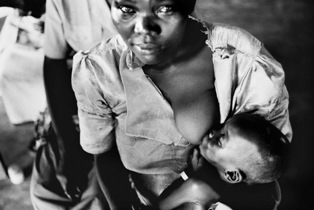Longer course of HIV drug helps babies who nurse
July / August 2008 | Volume 7, Issue 4

Photo: (c) 2006 Alessandro Vincenzi/Photoshare
A mother in northern Uganda breastfeeds her child at a
center thatprovides education on prevention of
mother-to-child transmission of HIV.
Babies born to HIV-infected mothers in low-resource countries and who were treated with nevirapine for six weeks had a significantly less chance of infection than infants receiving the standard single dose, new research conducted with Fogarty support shows.
In trials of more than 2,000 infants in Ethiopia, Uganda and India, a team of 275 scientists conducted randomized clinical trials to determine the effect of continual low-dosing of the drug.
"The extended-dose regimen significantly reduced the risk of overall infant death at both six weeks and six months of age, compared with the single-dose regimen," the study concluded, noting it is unclear what the optimal length of treatment is. After six weeks, there were 42 per cent fewer infant HIV infections or death, and 27 per cent fewer after six months.
The study, known as SWEN (Six Week Extended-Dose Nevirapine Study), involved many Fogarty alumni, and results were published in The Lancet to coincide with the 17th Annual International AIDS Conference.
Corresponding author Dr. Robert Bollinger, Country Director for the Hopkins/Fogarty International Programs in India and Democratic Republic of the Congo, said the study "demonstrates the benefits of 'South-South' collaboration among Fogarty trainees."
Although single doses of the drug can lead to drug-resistance and extended doses may lead to even more, the authors said, "Any risk of nevirapine resistance in HIV-infected infants needs to be considered in the context of the reduction in the risk of HIV transmission and the survival benefit seen among HIV-uninfected infants receiving extended-dose nevirapine."
In an accompanying commentary, Dr. Benjamin H. Chi, a former Fogarty International Research Scientist Development grantee, and co-author Dr. Jeffrey S.A. String, both of the University of Alabama, Birmingham, said, "Extended infant prophylaxis with nevirapine is simple enough to be implemented almost anywhere. It represents a long-awaited, if partial, solution to a mother's impossible choice. We should not delay."
About 800,000 babies worldwide are diagnosed with HIV each year, and one in three is believed to be infected by breastfeeding.
Extended-dose nevirapine to 6 weeks of age for infants to prevent HIV transmission via breastfeeding in Ethiopia, India, and Uganda: an analysis of three randomised controlled trials."Six Week Extended-Dose Nevirapine (SWEN) Study Team", The Lancet. Volume 372, Issue 9635, 26 July 2008-1 August 2008, Pages 300-313
To view Adobe PDF files,
download current, free accessible plug-ins from Adobe's website.
Related Global Health Research Topics